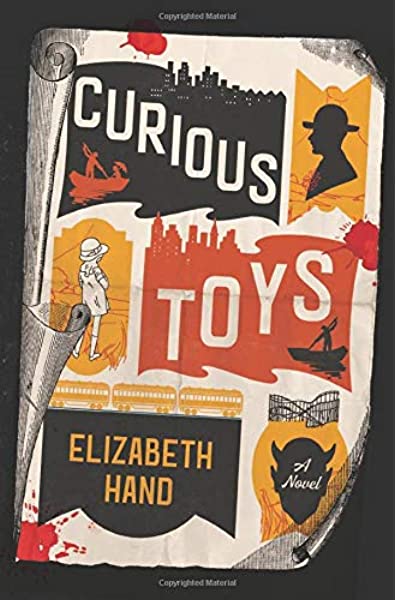
I’m not a big fan of serial killer novels, but some books transcend the genre–Thomas Harris’s RED DRAGON, for example, or BIRDMAN and THE TREATMENT by Mo Hayder. To that list add CURIOUS TOYS by Elizabeth Hand, published late last year (2019).
This is historical fiction of the first water, set in the summer of 1915 at Chicago’s Riverview Amusement Park and brought to life with a heady potion of sensory detail, slang, historical context, and sheer bravado that reminded me of Sarah Waters. The relentless August heat, the constant recorded screams from the Hell Gate ride, the miasma of scorched cotton candy and spilled beer, all twist the reader’s nerves to a painful pitch before the action even gets underway.
This is not the musical STATE FAIR, with apple pies and prize pigs and fun for the entire family. This is more NIGHTMARE ALLEY, with the two-faced She-Male, a gruesome film adaptation of Dante’s INFERNO, illicit sex on the dark rides, hashish cigarettes, French postcards, and a fake fortune teller. The main protagonist, 14-year-old Pin, has been masquerading as a boy all summer, relieved to be free from a gender assignment she’s always hated, but equally afraid of being found out.
Pin is not alone in grappling with forbidden physical desires; other tormented characters include a scenario writer for the booming Chicago movie industry, the serial killer himself, and the diminutive, obsessive Henry Darger. Darger is only one of several historical figures in CURIOUS TOYS, but he is clearly one of Hand’s own obsessions. In real life, Darger would go on to become an outsider artist and writer of international reputation. In the novel he functions as a sort of eccentric detective–emphasis on “eccentric”–in a bravura move that would seem a stretch for another writer, but that Hand pulls off elegantly, even movingly.
As she has proved before, most notably in the brilliant GENERATION LOSS, Hand can write the sort of suspense that takes over your life for the duration of the book, and do it with clean, elegant prose. CURIOUS TOYS ups the ante with the sort of thematic echoes that are the province of literature. Various dolls throughout the book connect with each other, and various beholders confuse them with real women, pointing to a kind of universal darkness in the male psyche. Darger’s obsession with little girls closely mirrors that of the killer, as Pin, at the end, mirrors the killer’s victims. The dovetailing of the movie business with the amusement park carries serious weight, as characters repeatedly choose illusion over reality: the killer in his carefully posed photos, the police in their frequent leaps to false conclusions, even, in a positive spin, Pin’s refusal of the trap of her birth gender.
CURIOUS TOYS is a dark ride that throws long shadows.
